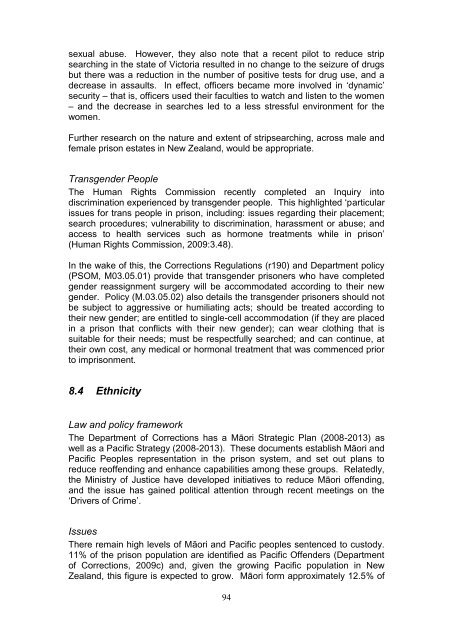Human Rights and Prisons - Rethinking Crime and Punishment
Human Rights and Prisons - Rethinking Crime and Punishment
Human Rights and Prisons - Rethinking Crime and Punishment
Create successful ePaper yourself
Turn your PDF publications into a flip-book with our unique Google optimized e-Paper software.
sexual abuse. However, they also note that a recent pilot to reduce strip<br />
searching in the state of Victoria resulted in no change to the seizure of drugs<br />
but there was a reduction in the number of positive tests for drug use, <strong>and</strong> a<br />
decrease in assaults. In effect, officers became more involved in „dynamic‟<br />
security – that is, officers used their faculties to watch <strong>and</strong> listen to the women<br />
– <strong>and</strong> the decrease in searches led to a less stressful environment for the<br />
women.<br />
Further research on the nature <strong>and</strong> extent of stripsearching, across male <strong>and</strong><br />
female prison estates in New Zeal<strong>and</strong>, would be appropriate.<br />
Transgender People<br />
The <strong>Human</strong> <strong>Rights</strong> Commission recently completed an Inquiry into<br />
discrimination experienced by transgender people. This highlighted „particular<br />
issues for trans people in prison, including: issues regarding their placement;<br />
search procedures; vulnerability to discrimination, harassment or abuse; <strong>and</strong><br />
access to health services such as hormone treatments while in prison‟<br />
(<strong>Human</strong> <strong>Rights</strong> Commission, 2009:3.48).<br />
In the wake of this, the Corrections Regulations (r190) <strong>and</strong> Department policy<br />
(PSOM, M03.05.01) provide that transgender prisoners who have completed<br />
gender reassignment surgery will be accommodated according to their new<br />
gender. Policy (M.03.05.02) also details the transgender prisoners should not<br />
be subject to aggressive or humiliating acts; should be treated according to<br />
their new gender; are entitled to single-cell accommodation (if they are placed<br />
in a prison that conflicts with their new gender); can wear clothing that is<br />
suitable for their needs; must be respectfully searched; <strong>and</strong> can continue, at<br />
their own cost, any medical or hormonal treatment that was commenced prior<br />
to imprisonment.<br />
8.4 Ethnicity<br />
Law <strong>and</strong> policy framework<br />
The Department of Corrections has a Māori Strategic Plan (2008-2013) as<br />
well as a Pacific Strategy (2008-2013). These documents establish Māori <strong>and</strong><br />
Pacific Peoples representation in the prison system, <strong>and</strong> set out plans to<br />
reduce reoffending <strong>and</strong> enhance capabilities among these groups. Relatedly,<br />
the Ministry of Justice have developed initiatives to reduce Māori offending,<br />
<strong>and</strong> the issue has gained political attention through recent meetings on the<br />
„Drivers of <strong>Crime</strong>‟.<br />
Issues<br />
There remain high levels of Māori <strong>and</strong> Pacific peoples sentenced to custody.<br />
11% of the prison population are identified as Pacific Offenders (Department<br />
of Corrections, 2009c) <strong>and</strong>, given the growing Pacific population in New<br />
Zeal<strong>and</strong>, this figure is expected to grow. Māori form approximately 12.5% of<br />
94
















